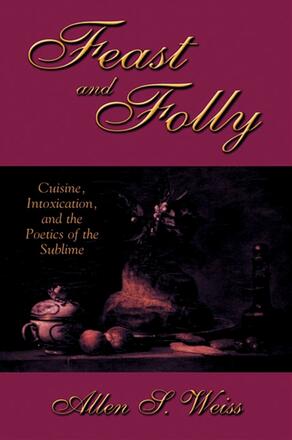
Feast and Folly
Cuisine, Intoxication, and the Poetics of the Sublime
Alternative formats available from:
Treats French cuisine as a "fine art," offering both historical background as well as a deep analysis of the social, political, and aesthetic aspects of cuisine and taste.
Description
What would it mean to speak of cuisine as a "fine art"? Combining an analysis of French cuisine with cutting-edge postmodernist critique, Feast and Folly provides a fascinating history of French gastronomy and cuisine over the past two centuries, as well as considerable detail regarding the preparation of some of the colossal meals described in the book. It offers a deep analysis of the social, political, and aesthetic aspects of cuisine and taste, exploring the conceptual preconditions, the discursive limits, and the poetics and rhetorical forms of the modern culinary imagination. Allen S. Weiss analyzes the structural preconditions of considering cuisine as a fine art, connects the diverse discursive conditions that give meaning to the notion of cuisine as artwork, and investigates the most extreme psychological and metaphysical condition of the aesthetic domain—the sublime—in relation to gastronomy.
Allen S. Weiss teaches in the Departments of Performance Studies and Cinema Studies at New York University. He is the author and editor of over twenty-five books, including The Aesthetics of Excess and Perverse Desire and the Ambiguous Icon, both published by SUNY Press, and (with Lawrence R. Schehr) French Food: On the Table, On the Page, and in French Culture.
Reviews
"The author's knowledge of cuisine, philosophy, and literature is truly overwhelming … The work is written for a specialized audience of readers familiar with the practices of postmodern analysis, readers expecting and appreciating the abstraction and fragmentation which characterize the approach. For this audience, Feast and Folly is a collection of fascinating and insightful essays on extreme examples of gastronomic writing. " — French Review
"Allen Weiss's Feast and Folly is exactly that: delicious, ravishing, and sublime! A remarkable, delightful, beautifully written, and brilliantly argued work. " — David B. Allison, author of Reading the New Nietzsche
"An exciting, fascinating book that engages various aspects of food studies, literature and the arts, and cultural studies in the best possible sense. What is unexpected is the way in which Weiss brings together these various fields of inquiry. His insights into French food are exciting and are new contributions to the field. A brilliant book. " — Lawrence R. Schehr, coeditor of French Food: On the Table, On the Page, and in French Culture
"Outstanding. Weiss's prose is beautiful, and he demonstrates exquisite knowledge of the history of cuisine, especially French cuisine. He brings the understanding of recent French cuisine to a new dimension, stressing its postmodernity in its efforts at hybridization, its borrowing of other traditions and cultures, and its recycling of its own old traditions. The book also integrates, brilliantly, the presence of cuisine in the French literary productions from nineteenth-century authors to more recent ones. " — Pierre Saint-Amand, author of The Laws of Hostility: Politics, Violence, and the Enlightenment